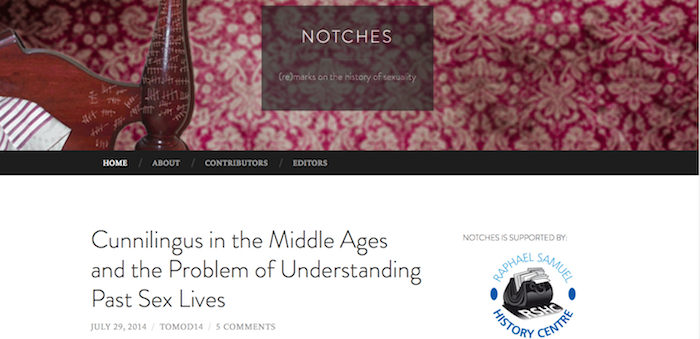International Open-Access Blog on the History of Sexuality Is Drawing Attention
“Notches: (re)marks on the history of sexuality” is a collaborative, international, open-access blog that was established in order to encourage thinking about the history of sexuality in its broadest sense. It is edited by Justin Bengry (McGill/Birkbeck), Gillian Frank (Princeton), Katherine Harvey (Birkbeck), Julia Laite (Birkbeck) and Amy Tooth Murphy (Roehampton). Recognizing the limited provision for engaged writing on the history of sexuality that went beyond the boundaries of particular countries, periods and themes, we founded Notches in order to open up a wider conversation about sex and sexuality in the present and in the past.
Notches publishes weekly or bi-weekly blogs written by an international collection of two-dozen senior and early-career scholars, postgrad students, activists and other writers. Bloggers are encouraged to write about their own research and pedagogy, the state of the field, and the ways in which the history of sexuality informs present-day issues. Since launching in January, the blog has achieved more than 50,000 views and 1,100 active subscribers, confirming a widespread enthusiasm for accessible scholarship on histories of sex and sexuality.
Notches is affiliated with the Raphael Samuel History Centre, and furthers its mission of making history accessible to a broad public. In this vein, our authors frequently use debates over present day sexual values and controversies as an entry point to explain how current events have been shaped by struggles over sexuality in the past. Our posts—which are fundamentally historical or historiographical in perspective—aspire to be engagingly written, accessible, and imaginative in their approach to the history of sexuality.
With upward of 60 blog posts, which span across theme, period and region, Notches showcases the robustness and diversity of the field. Our contributors have written on topics ranging from sexuality and ageing and the aesthetic uses of sex in Japanese dance. They have historicized contemporary intersections of US civil rights and LGBT rights movements, explored the world of medieval aphrodisiacs and uncovered early gay and lesbian radicalism. Others have asked us to remember the colonial origins of conflicts over sex and sexuality in several non-Western societies. Drawing these posts together is a commitment to using sexuality as a capacious category of analysis.
Indeed, Notches demonstrates that sex and sexuality are ‘useful categories’ for understanding political and economic histories, religious history, histories of childhood, colonialism and imperialism, not to mention activism, public history, pedagogy, gender and race. Notches is the history of sexuality today: vital, active, multi-directional, collectively producing a plurality of voices, opinions and perspectives.
